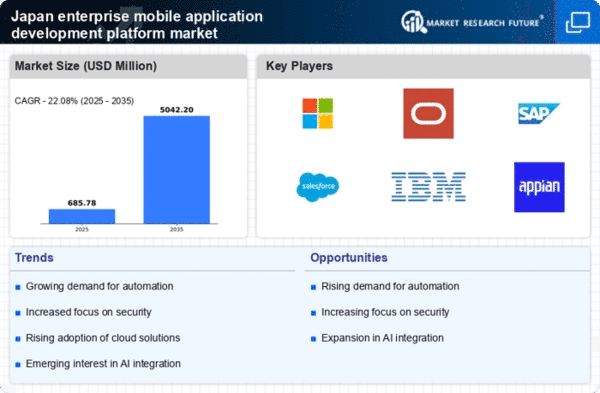Growing Focus on User Experience
User experience (UX) has become a critical factor in the success of mobile applications, thereby impacting the enterprise mobile-application-development-platform market in Japan. Organizations are increasingly prioritizing UX design to ensure that their applications are intuitive, engaging, and user-friendly. This focus on UX is driven by the need to enhance customer satisfaction and retention. According to recent studies, applications with superior UX can lead to a 30% increase in user engagement. As a result, businesses are investing in platforms that offer advanced UX design capabilities, which is likely to stimulate growth in the enterprise mobile-application-development-platform market. The emphasis on creating seamless and enjoyable user experiences is expected to shape the development strategies of companies, leading to more innovative and effective mobile applications.
Rising Demand for Mobile Solutions
The enterprise mobile-application-development-platform market in Japan is experiencing a notable surge in demand for mobile solutions. As businesses increasingly recognize the necessity of mobile applications for operational efficiency and customer engagement, the market is projected to grow at a compound annual growth rate (CAGR) of approximately 15% over the next five years. This growth is driven by the need for organizations to enhance their digital presence and streamline processes through mobile technology. Companies are investing in mobile applications to improve communication, facilitate remote work, and provide better services to customers. The increasing reliance on mobile devices for business operations is likely to further propel the enterprise mobile-application-development-platform market, as organizations seek to leverage mobile capabilities to remain competitive in a rapidly evolving digital landscape.
Shift Towards Cloud-Based Solutions
The shift towards cloud-based solutions is significantly impacting the enterprise mobile-application-development-platform market in Japan. As organizations increasingly adopt cloud technologies, the demand for mobile applications that can seamlessly integrate with cloud services is on the rise. Cloud-based platforms offer scalability, flexibility, and cost-effectiveness, making them attractive options for businesses looking to develop and deploy mobile applications. This trend is reflected in the growing number of enterprises migrating their operations to the cloud, with estimates indicating that over 60% of Japanese companies are expected to adopt cloud solutions by 2026. Consequently, the enterprise mobile-application-development-platform market is likely to experience accelerated growth as businesses seek to leverage cloud capabilities for their mobile application needs, fostering a more dynamic and responsive development environment.
Integration of Artificial Intelligence
The integration of artificial intelligence (AI) into mobile applications is emerging as a transformative driver for the enterprise mobile-application-development-platform market. In Japan, businesses are increasingly leveraging AI technologies to enhance the functionality and performance of their mobile applications. AI can facilitate personalized user experiences, automate processes, and provide valuable insights through data analysis. This trend is particularly relevant as organizations seek to differentiate themselves in a competitive market. The enterprise mobile-application-development-platform market is likely to benefit from this integration, as platforms that incorporate AI capabilities are expected to attract more developers and businesses. The potential for AI to revolutionize mobile application development suggests a promising future for the market, with innovations that could redefine user interactions and operational efficiencies.
Government Initiatives Supporting Digital Transformation
In Japan, government initiatives aimed at promoting digital transformation are significantly influencing the enterprise mobile-application-development-platform market. The government has launched various programs to encourage businesses to adopt digital technologies, which includes mobile application development. These initiatives are designed to enhance productivity and innovation across industries. For instance, the Ministry of Economy, Trade and Industry (METI) has been actively supporting small and medium-sized enterprises (SMEs) in their digital transformation efforts. This support is expected to lead to an increase in the adoption of mobile applications, thereby driving growth in the enterprise mobile-application-development-platform market. As businesses align with government objectives, the market is likely to witness a boost in investment and development activities, fostering a more robust ecosystem for mobile application solutions.
















